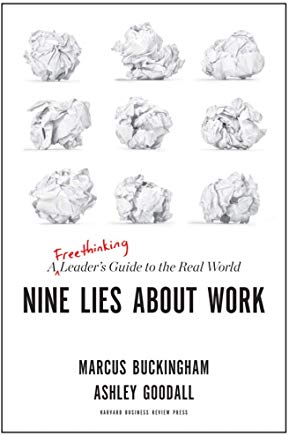By William Carmichael
Introduction
So many of us are Marcus Buckingham fans and for good reason. His talent lies in providing excellent advice in a colorful and informative manner. Co-authored with Ashley Goodall, who is certainly no novice to human performance himself, this latest work will strike a positive nerve with readers. Nine Lies About Work: A Freethinking Leader’s Guide to the Real World takes our most standard and accepted stereotypical understandings of how organizations act and turns them on their heads. It is not that they mean to disarm us, rather, they expose the myths that we have openly and honestly accepted as facts within organizational behaviors.
Misconceptions about behaviors? Surely not!
The book begins with a paradox. To quote the authors, “Why do so many of the ideas and practices that are held as settled truths at work wind up being so deeply frustrating to, and unpopular with, the very people they are supposed to serve?” Naturally, I asked myself what these truths were? In this case, truths are those norms we accept as required behaviors. For example, organizations promote the concept of engagement, which as an accepted canon for most companies carries with it the expectation that it will forever be in use. This just makes perfect sense . . . right? After all, doesn’t any organization want engaged, productive employees? Interestingly, Buckingham and Goodall drive home the point that ‘engagement’ as an active trait has likely run its course.
Our authors make clear that other workplace attributes such as strategic planning, performance feedback and work-life balance, each falls prey to our overuse and reliance upon systems, processes, and procedures beyond our control. The questions Buckingham and Goodall pose are not that these aren’t necessary, but rather, each has a natural life-cycle. Certainly goal-setting, is a normal part of business and is not likely to change. However, what the authors do challenge is the accepted pattern of cascading the goals that for the most part becomes a ritualistic spinoff. I firmly believe that organizational goals should and must be shared with stakeholders. However, this necessary allocation is not what our authors are concerned about, rather, the meaning behind the goals. Certainly, inconsistent meanings to be sure. What this book stresses is a “don’t tell them what you value, show them.” The fact is, rituals are fine but they have to have the same meaning to everyone.
So then . . . what now?
“The problem,” as our authors so aptly state “is that too many leaders (HR and otherwise) have brought into certain notions and stereotypes about what motivates and inspires people.” One of these, Lie # 5, is that people need and require feedback. Feedback, as in regular and continuous. But this feedback, as regular and continuous as may be practical, typically serves only one benefactor. One can argue this logic but the point Buckingham and Goodall make is that what employees actually need is advice and guidance.
Now this next one gave me a jolt of sorts! The authors call this one Lie # 7, or “people have potential.” However, the fact is that most companies only invest in development programs for their high performers as a means of building their pipeline of future leaders yet invest little to nothing for those performing at a lower scale. And for those companies who believe that “our people are our best asset,” if they truly are, may need to rethink this intonation.
Structure and Layout
Marcus Buckingham’s books tend to use an odd number of main points (5, 7, 9, etc.) in an effort to help readers connect to and retain the information and Nine Lies About Work has this structure. Readers will likely find some topics more significant. As an example, Lie # 8 ‘Work-life balance matter most’ caught my attention quickly so that is the one I read first. True, this topic does relate to earlier ones but stands on its own.
It is important to note that within each topic or ‘lie” lays a ‘truth’ which the authors carefully drive home with each topic. The nine topics discussed are:
| Lie | Truth | ||
| 1 | People care which company they work for | 1 | People care which team they’re on |
| 2 | The best plan wins | 2 | The best intelligence wins |
| 3 | The best companies cascade goals | 3 | The best companies cascade meaning |
| 4 | The best people are well-rounded | 4 | The best people are spiky |
| 5 | People need feedback | 5 | People need attention |
| 6 | People can reliably rate other people | 6 | People can reliably rate their own experience |
| 7 | People have potential | 7 | People have momentum |
| 8 | Work-life balance matters most | 8 | Love-in-work matters most |
| 9 | Leadership is a thing | 9 | We follow spikes |
This is an excellent read and one I highly recommend!
Who Will Benefit Most from This Book?
HR Senior Leadership, Senior Organizational Leaders, Organizational Strategists
About the authors:
Marcus Buckingham is a global researcher and thought leader focused on unlocking people’s strengths, increasing their performance, and pioneering the future of how people work. He is head of all people and performance research at the ADP Research Institute and the author of several bestselling books. Ashley Goodall is Senior Vice President of Leadership and Team Intelligence at Cisco. He is also the coauthor with Marcus Buckingham on “Reinventing Performance Management,” the cover story in the April 2015 issue of Harvard Business Review.

Professor | Strayer University
william.carmichael@strayer.edu
www.strayer.edu
